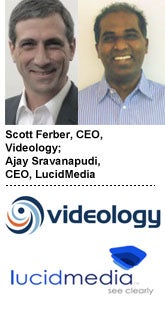 Video ad platform Videology’s purchase of demand side player LucidMedia is part of a continuing strategy to break down the walls between serving buyers and sellers across all devices and platforms. Even though this is its second recent deal, following the acquisition of Collider in August, the company says that it’s not about to embark on an acquisition spree and there is no other M&A activity in the works.
Video ad platform Videology’s purchase of demand side player LucidMedia is part of a continuing strategy to break down the walls between serving buyers and sellers across all devices and platforms. Even though this is its second recent deal, following the acquisition of Collider in August, the company says that it’s not about to embark on an acquisition spree and there is no other M&A activity in the works.
As CEO Scott Ferber told AdExchanger, the reasoning on the timing of the two purchases is simple: you can either spend tens of millions of dollars — and several years — building a better tech stack, or you can find one or two suitable partners that will allow you to skip several steps.
“We did things the slower way when we were at Advertising.com,” said Ferber, who co-founded Ad.com and sold it to AOL after leading the company with his brother, John, for eight years. “Ad.com represented the bringing together of four different media categories: there was search, display email and affiliate sales. Right now, video advertising is still the most complex to execute, because its the newest and because of the aspects of sight, sound and motion that other ad forms don’t have. With everything changing so rapidly in the display and video space, you really don’t have a lot of time and resources to do everything yourself.”
The specific capabilities Videology is getting from LucidMedia are a separate thing from the general strengthening of the operation’s technology stack. In August, Videology bought mobile data management platform Collider, not so much for the sake of owning a DMP, but rather, for the publisher-facing, supply side abilities that Collider brought to Videology’s demand-side focus. With LucidMedia, Videology may appear to be building up its marketer/agency muscles, but both acquisitions reflect a desire to broaden the company’s strategy at a time when silos on both the buy and sell sides are evaporating and mobile video usage and dollars are rising.
“The big opportunity is in integrated media planning, buying and managing,” Ferber said in a conference call with LucidMedia CEO Ajay Sravanapudi. “The question we all face is: how do you coordinate all that as opposed to operating within distinct silos. As we all know, devices inform our behavior in unique ways. Advertising across platforms still doesn’t reflect that. There’s TV commercials fitting in to the traditional lean back position of that medium. And that’s a different experience than when you’re presented a display ad in the middle of CNBC video on your smartphone. The ability to plan all those consumer touchpoints in a fragmented world is where we find ourselves. And we’re being asked to bring both sides together.”
Videology and LucidMedia began working together six months ago. The two were largely brought together by LucidMedia’s work in display and rich media, but the evolution of a greater mobile focus is what inspired the merger. “Mobile usage is going to continue to skyrocket,” Ferber said. “The problem is that there’s so much inventory and demand hasn’t kept pace, primarily because the advertising doesn’t reflect the experience. Bringing Collider, LucidMedia and Videology to bear on that, helping advertisers and publishers on all screens, will help push the marketplace’s evolution.”
LucidMedia’s brand will remain in the marketplace and Sravanapudi, who will continue to head the operation as well as work on developing Videology’s platform business. “Our specialty began with contextual targeting and ultimately, we became more interested in operating a performance-based ad company in an exchange environment, where everything by nature is ‘dynamic,'” Sravanapudi said. “And that’s why our position and Videology’s position fits very well together.”










